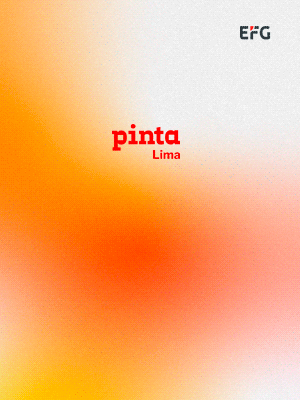THE POLITICS OF THE ARCHIVE: VOLUSPA JARPA IN THE OFFICE
The work of Voluspa Jarpa (Rancagua, Chile, 1971) has had a very preeminent focus on the political concept surrounding archiving and its documents. Attracted to investigate more about its multiple meanings as a result of the declassification of secrets, specifically the one carried out by the Clinton administration regarding the 1973 coup d'état against Salvador Allende, the artist begins a discursive investigation on the importance of the archival support and the materiality it has as a political document, which leads her to qualify that presupposed legibility.
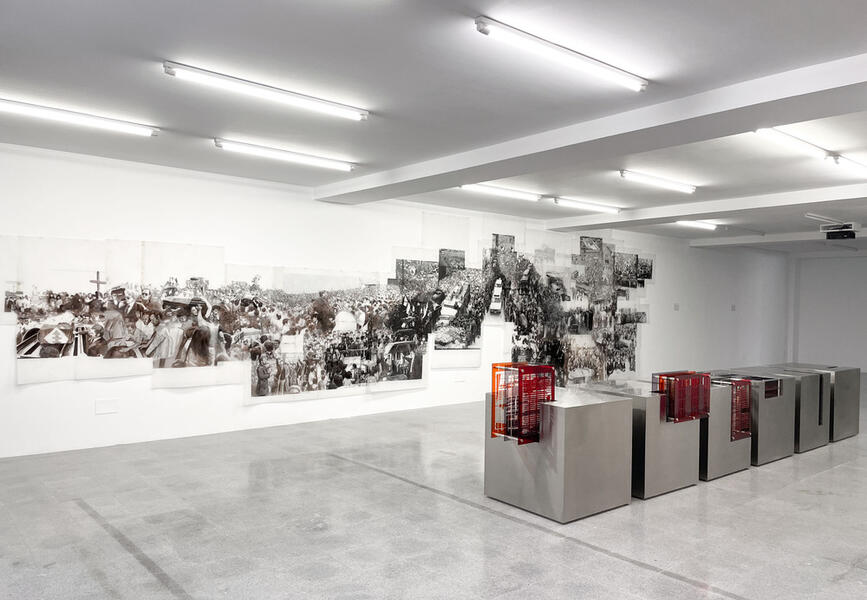
Within these parameters, Jarpa delves into the hidden, into the secret that, even when revealed, remains undisclosed, into those black strips that impede the total process of legibility and that elevate the declassified archive to perpetuate the refusal of absolute clarification, emphasizing with this function that the support also shows what is illegible.
In Política de las formas, the gallery La Oficina proposes a profound journey that starts from these theses. Through the space, we approach her vision of the hidden and visible process of the archive, of the symbology and imagery that brings us closer to it through infographics, documentary material, newspaper archive residues that reach a new meaning and, even so, not their full being. Her proposal also values the semiotics of the act, that which seems to punish and point out justice against the executors and that, nevertheless, can end up rewarding it with the fragmentation of evidence and proofs that make the logical sense of the archive disappear and mistreat, or condition, the vital function of its historical and historiographical record.
Jarpa's work will also bring us closer, in a tangential way, to the role of the plastic arts and their market and expansion as a propaganda weapon, especially in relation to the American practices of the immediate and present decades after the coup in Chile. The artist proposes to make this plot visible, linking it directly to the processes of construction, containment and destruction of memory and putting on the table its main axis: politics and the politics of the archives.
-
Voluspa Jarpa _ Política de las formas 1
-
Voluspa Jarpa _ Política de las formas 1
-
Voluspa Jarpa _ Política de las formas 2
-
Voluspa Jarpa _ Política de las formas 3
-
Voluspa Jarpa _ Política de las formas 4
-
Voluspa Jarpa _ Política de las formas 5
-
Voluspa Jarpa _ Política de las formas 6
-
Voluspa Jarpa _ Política de las formas 7
-
Voluspa Jarpa _ Política de las formas 8
Política de las formas can be seen until December 21 at La Oficina, Morenés Arteaga, 9, Madrid (Spain).
May interest you
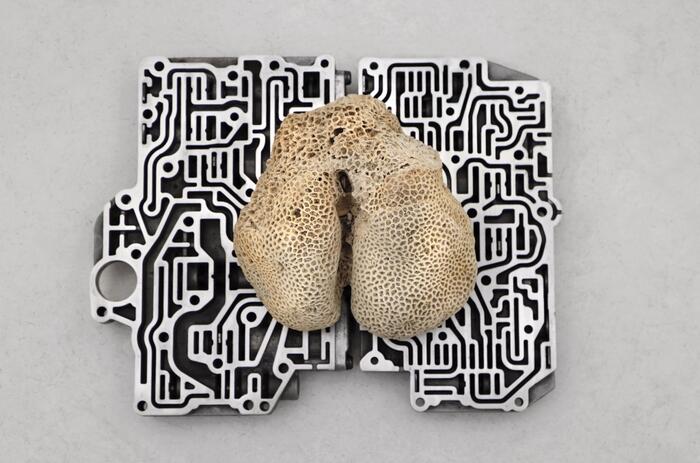
The work Nicolás Lamas (Lima, Peru, 1980) presents at The Goma Galery in his solo show Flujos atemporales/sedimentos cognitivos is circumscribed to his way of understanding relationships in a network of knowledge that involves the worlds of the natural and the cultural. Both spheres are the ones that lead him to use in his production processes different materials, artificial and organic, with which he gives life to hybrid elements that have an impact on the viewer's perception.

The work Nicolás Lamas (Lima, Peru, 1980) presents at The Goma Galery in his solo show Flujos atemporales/sedimentos cognitivos is circumscribed to his way of understanding relationships in a network of knowledge that involves the worlds of the natural and the cultural. Both spheres are the ones that lead him to use in his production processes different materials, artificial and organic, with which he gives life to hybrid elements that have an impact on the viewer's perception.
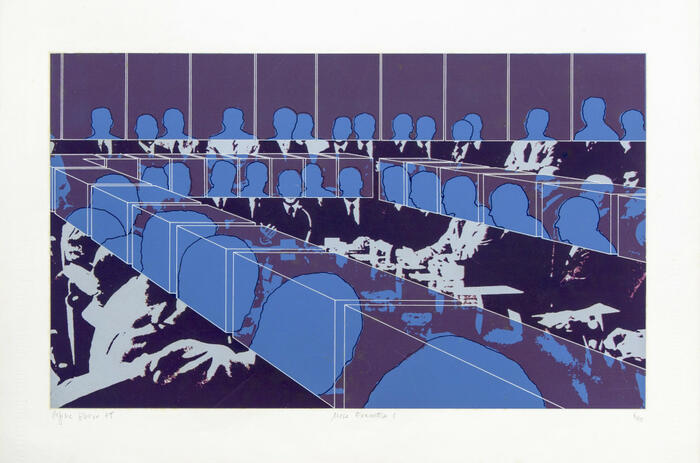
Barcelona's Center of Image La Virreina (La Virreina Centre de la Imatge) is dedicating an extensive exhibition to Regina Silveira (Porto Alegre, Brazil, 1939), one of the multimedia artists and key figures of Latin American conceptual art. Within the exhibition line of the center, which advocates the exploration of the aesthetic and ideological languages of images, this show curated by Isabella Lenzi covers a wide range of the Brazilian artist's research, experimentation and artistic production, particularly that developed with technical reproduction techniques and the circulation of images.
REGINA SILVEIRA'S DESTRUCTION OF POWER
Barcelona's Center of Image La Virreina (La Virreina Centre de la Imatge) is dedicating an extensive exhibition to Regina Silveira (Porto Alegre, Brazil, 1939), one of the multimedia artists and key figures of Latin American conceptual art. Within the exhibition line of the center, which advocates the exploration of the aesthetic and ideological languages of images, this show curated by Isabella Lenzi covers a wide range of the Brazilian artist's research, experimentation and artistic production, particularly that developed with technical reproduction techniques and the circulation of images.
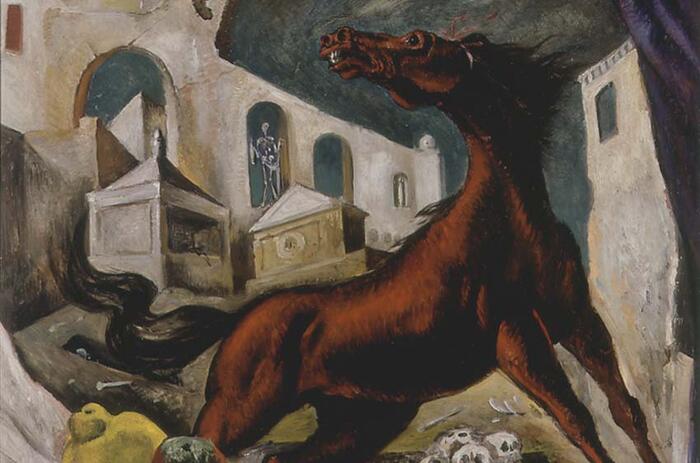
Fundación Casa de Mexico in Spain hosts the exhibition Modern Art of Mexico, with funds from the Blaisten Collection and curated by Daniel Garza Usabiaga, which takes an interesting look at the country's 20th century production through the eyes of Margarita Nelken (Madrid, Spain, 1894-Mexico City, Mexico, 1968).
MEXICAN MODERN ART ACCORDING TO NELKEN AND THE BLAISTEN COLLECTION
Fundación Casa de Mexico in Spain hosts the exhibition Modern Art of Mexico, with funds from the Blaisten Collection and curated by Daniel Garza Usabiaga, which takes an interesting look at the country's 20th century production through the eyes of Margarita Nelken (Madrid, Spain, 1894-Mexico City, Mexico, 1968).
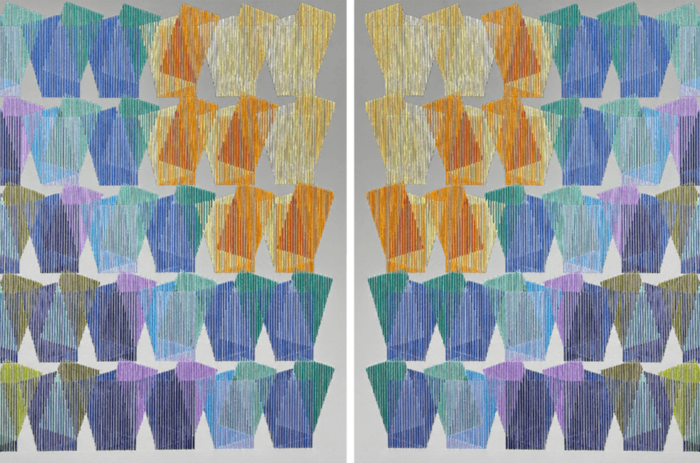
Isabella Despujols (Barquisemeto, Venezuela, 1994), Venezuelan artist based in Brazil, uses her artistic references for the realization of her latest series of works, a set made this year where textiles and embroidery are especially relevant, as well as the formal fact that they reflect. In them is palpable the conversation that he intends to maintain with those styles and languages that were fundamental in the countries to which he circumscribes his personal experience.
DESPUJOLS' EMBROIDERED GEOMETRY AT LLAMAZARES
Isabella Despujols (Barquisemeto, Venezuela, 1994), Venezuelan artist based in Brazil, uses her artistic references for the realization of her latest series of works, a set made this year where textiles and embroidery are especially relevant, as well as the formal fact that they reflect. In them is palpable the conversation that he intends to maintain with those styles and languages that were fundamental in the countries to which he circumscribes his personal experience.

Based on the biologicist theories on territoriality and the relationships derived from living beings with their immediate environment, the Angeles Baños gallery from Badajoz proposes an exhibition project to three Latin American artists so that, through their experiences and their personal vision, they can materialize and express those feelings of territoriality, and always from the parallelism of the human being with the rest of living beings.
THE TERRITORIAL BY THREE LATIN AMERICAN ARTISTS AT ÁNGELES BAÑOS
Based on the biologicist theories on territoriality and the relationships derived from living beings with their immediate environment, the Angeles Baños gallery from Badajoz proposes an exhibition project to three Latin American artists so that, through their experiences and their personal vision, they can materialize and express those feelings of territoriality, and always from the parallelism of the human being with the rest of living beings.

The Museum of Pontevedra exhibits Vento (wind, in Galician), the proposal that the artist Alberto Baraya (Bogota, Colombia, 1968) has developed and now shows at its headquarters in the Castelao Building as part of the cycle of exhibitions Infiltracións. This program aims to carry out specific projects that have as their backbone the dialogue arising from research and work with pieces from the collection of the Galician institution to promote re-readings on it.
VENTO BY ALBERTO BARAYA – IN PONTEVEDRA
The Museum of Pontevedra exhibits Vento (wind, in Galician), the proposal that the artist Alberto Baraya (Bogota, Colombia, 1968) has developed and now shows at its headquarters in the Castelao Building as part of the cycle of exhibitions Infiltracións. This program aims to carry out specific projects that have as their backbone the dialogue arising from research and work with pieces from the collection of the Galician institution to promote re-readings on it.
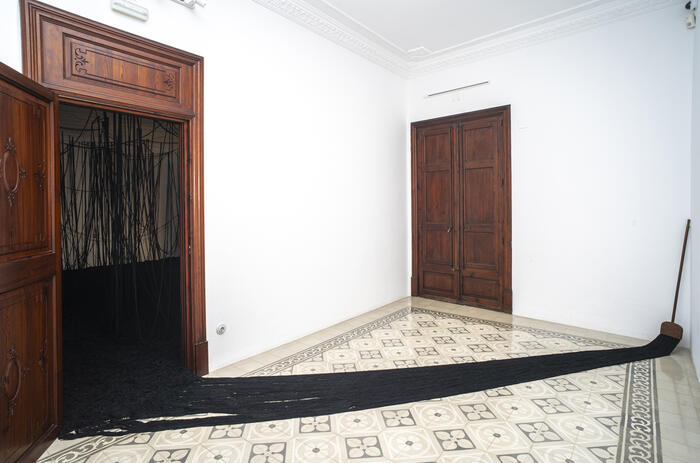
ALTTRA Foundation organizes in three spaces in Palma, on the island of Mallorca, an exhibition that addresses the theme of insularity and its role and idiosyncrasy in a globalized world through several works by Cildo Meireles (Rio de Janeiro, Brazil, 1948). The works chosen, corresponding to five different periods of the artistic production of one of the referents of Brazilian neo-conceptualism, trace a journey through some of the themes and investigations that the artist has developed throughout his life, from fortune and chance to the perception of the physically invisible but perceptible, such as sound, or the relationship between space and its use.
CILDO MEIRELES EN PALMA DE MALLORCA
ALTTRA Foundation organizes in three spaces in Palma, on the island of Mallorca, an exhibition that addresses the theme of insularity and its role and idiosyncrasy in a globalized world through several works by Cildo Meireles (Rio de Janeiro, Brazil, 1948). The works chosen, corresponding to five different periods of the artistic production of one of the referents of Brazilian neo-conceptualism, trace a journey through some of the themes and investigations that the artist has developed throughout his life, from fortune and chance to the perception of the physically invisible but perceptible, such as sound, or the relationship between space and its use.
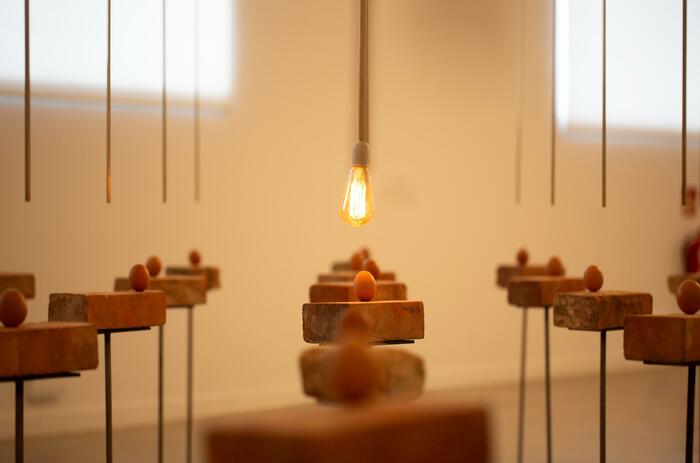
Contemplando es como fuimos cambiando (Contemplating is how we changed) is the exhibition, the first one in Spain promoted by an institution, that the CICC Tabakalera in San Sebastian is dedicating to Gabriel Chaile (San Miguel de Tucumán, Argentina, 1985), one of the most prominent names in contemporary Latin American sculpture. This proposal is intended to take an extensive look at his work, from his beginnings to his latest works produced in Lisbon, and which is recognizable by his monumental adobe, clay and metal pieces that reflect the morphology of the pre-Columbian ceramics of his native region.
GABRIEL CHAILE’S SCULPTURE AT TABAKALERA
Contemplando es como fuimos cambiando (Contemplating is how we changed) is the exhibition, the first one in Spain promoted by an institution, that the CICC Tabakalera in San Sebastian is dedicating to Gabriel Chaile (San Miguel de Tucumán, Argentina, 1985), one of the most prominent names in contemporary Latin American sculpture. This proposal is intended to take an extensive look at his work, from his beginnings to his latest works produced in Lisbon, and which is recognizable by his monumental adobe, clay and metal pieces that reflect the morphology of the pre-Columbian ceramics of his native region.
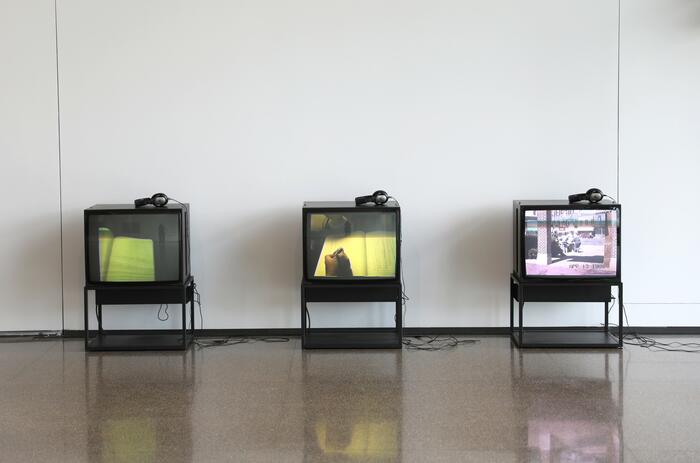
The exhibition Contar Rutinas (Counting Routines) dedicated by the Cerezales Antonino and Cinia Foundation to the work of Ana Amorim (São Paulo, Brazil, 1956) includes a selection of actions and performative works and installations that reflect the activity of the Brazilian artist from the 1980s to the present. The architecture of this exhibition is marked by the artist's daily conceptual and performative routines, reflecting their influence in the results of monumental dimensions.
ANA AMORIM'S REGISTER OF THE ROUTINE
The exhibition Contar Rutinas (Counting Routines) dedicated by the Cerezales Antonino and Cinia Foundation to the work of Ana Amorim (São Paulo, Brazil, 1956) includes a selection of actions and performative works and installations that reflect the activity of the Brazilian artist from the 1980s to the present. The architecture of this exhibition is marked by the artist's daily conceptual and performative routines, reflecting their influence in the results of monumental dimensions.

The work Nicolás Lamas (Lima, Peru, 1980) presents at The Goma Galery in his solo show Flujos atemporales/sedimentos cognitivos is circumscribed to his way of understanding relationships in a network of knowledge that involves the worlds of the natural and the cultural. Both spheres are the ones that lead him to use in his production processes different materials, artificial and organic, with which he gives life to hybrid elements that have an impact on the viewer's perception.

Barcelona's Center of Image La Virreina (La Virreina Centre de la Imatge) is dedicating an extensive exhibition to Regina Silveira (Porto Alegre, Brazil, 1939), one of the multimedia artists and key figures of Latin American conceptual art. Within the exhibition line of the center, which advocates the exploration of the aesthetic and ideological languages of images, this show curated by Isabella Lenzi covers a wide range of the Brazilian artist's research, experimentation and artistic production, particularly that developed with technical reproduction techniques and the circulation of images.
REGINA SILVEIRA'S DESTRUCTION OF POWER
Barcelona's Center of Image La Virreina (La Virreina Centre de la Imatge) is dedicating an extensive exhibition to Regina Silveira (Porto Alegre, Brazil, 1939), one of the multimedia artists and key figures of Latin American conceptual art. Within the exhibition line of the center, which advocates the exploration of the aesthetic and ideological languages of images, this show curated by Isabella Lenzi covers a wide range of the Brazilian artist's research, experimentation and artistic production, particularly that developed with technical reproduction techniques and the circulation of images.

Fundación Casa de Mexico in Spain hosts the exhibition Modern Art of Mexico, with funds from the Blaisten Collection and curated by Daniel Garza Usabiaga, which takes an interesting look at the country's 20th century production through the eyes of Margarita Nelken (Madrid, Spain, 1894-Mexico City, Mexico, 1968).
MEXICAN MODERN ART ACCORDING TO NELKEN AND THE BLAISTEN COLLECTION
Fundación Casa de Mexico in Spain hosts the exhibition Modern Art of Mexico, with funds from the Blaisten Collection and curated by Daniel Garza Usabiaga, which takes an interesting look at the country's 20th century production through the eyes of Margarita Nelken (Madrid, Spain, 1894-Mexico City, Mexico, 1968).

Isabella Despujols (Barquisemeto, Venezuela, 1994), Venezuelan artist based in Brazil, uses her artistic references for the realization of her latest series of works, a set made this year where textiles and embroidery are especially relevant, as well as the formal fact that they reflect. In them is palpable the conversation that he intends to maintain with those styles and languages that were fundamental in the countries to which he circumscribes his personal experience.
DESPUJOLS' EMBROIDERED GEOMETRY AT LLAMAZARES
Isabella Despujols (Barquisemeto, Venezuela, 1994), Venezuelan artist based in Brazil, uses her artistic references for the realization of her latest series of works, a set made this year where textiles and embroidery are especially relevant, as well as the formal fact that they reflect. In them is palpable the conversation that he intends to maintain with those styles and languages that were fundamental in the countries to which he circumscribes his personal experience.

Based on the biologicist theories on territoriality and the relationships derived from living beings with their immediate environment, the Angeles Baños gallery from Badajoz proposes an exhibition project to three Latin American artists so that, through their experiences and their personal vision, they can materialize and express those feelings of territoriality, and always from the parallelism of the human being with the rest of living beings.
THE TERRITORIAL BY THREE LATIN AMERICAN ARTISTS AT ÁNGELES BAÑOS
Based on the biologicist theories on territoriality and the relationships derived from living beings with their immediate environment, the Angeles Baños gallery from Badajoz proposes an exhibition project to three Latin American artists so that, through their experiences and their personal vision, they can materialize and express those feelings of territoriality, and always from the parallelism of the human being with the rest of living beings.

The Museum of Pontevedra exhibits Vento (wind, in Galician), the proposal that the artist Alberto Baraya (Bogota, Colombia, 1968) has developed and now shows at its headquarters in the Castelao Building as part of the cycle of exhibitions Infiltracións. This program aims to carry out specific projects that have as their backbone the dialogue arising from research and work with pieces from the collection of the Galician institution to promote re-readings on it.
VENTO BY ALBERTO BARAYA – IN PONTEVEDRA
The Museum of Pontevedra exhibits Vento (wind, in Galician), the proposal that the artist Alberto Baraya (Bogota, Colombia, 1968) has developed and now shows at its headquarters in the Castelao Building as part of the cycle of exhibitions Infiltracións. This program aims to carry out specific projects that have as their backbone the dialogue arising from research and work with pieces from the collection of the Galician institution to promote re-readings on it.

ALTTRA Foundation organizes in three spaces in Palma, on the island of Mallorca, an exhibition that addresses the theme of insularity and its role and idiosyncrasy in a globalized world through several works by Cildo Meireles (Rio de Janeiro, Brazil, 1948). The works chosen, corresponding to five different periods of the artistic production of one of the referents of Brazilian neo-conceptualism, trace a journey through some of the themes and investigations that the artist has developed throughout his life, from fortune and chance to the perception of the physically invisible but perceptible, such as sound, or the relationship between space and its use.
CILDO MEIRELES EN PALMA DE MALLORCA
ALTTRA Foundation organizes in three spaces in Palma, on the island of Mallorca, an exhibition that addresses the theme of insularity and its role and idiosyncrasy in a globalized world through several works by Cildo Meireles (Rio de Janeiro, Brazil, 1948). The works chosen, corresponding to five different periods of the artistic production of one of the referents of Brazilian neo-conceptualism, trace a journey through some of the themes and investigations that the artist has developed throughout his life, from fortune and chance to the perception of the physically invisible but perceptible, such as sound, or the relationship between space and its use.

Contemplando es como fuimos cambiando (Contemplating is how we changed) is the exhibition, the first one in Spain promoted by an institution, that the CICC Tabakalera in San Sebastian is dedicating to Gabriel Chaile (San Miguel de Tucumán, Argentina, 1985), one of the most prominent names in contemporary Latin American sculpture. This proposal is intended to take an extensive look at his work, from his beginnings to his latest works produced in Lisbon, and which is recognizable by his monumental adobe, clay and metal pieces that reflect the morphology of the pre-Columbian ceramics of his native region.
GABRIEL CHAILE’S SCULPTURE AT TABAKALERA
Contemplando es como fuimos cambiando (Contemplating is how we changed) is the exhibition, the first one in Spain promoted by an institution, that the CICC Tabakalera in San Sebastian is dedicating to Gabriel Chaile (San Miguel de Tucumán, Argentina, 1985), one of the most prominent names in contemporary Latin American sculpture. This proposal is intended to take an extensive look at his work, from his beginnings to his latest works produced in Lisbon, and which is recognizable by his monumental adobe, clay and metal pieces that reflect the morphology of the pre-Columbian ceramics of his native region.

The exhibition Contar Rutinas (Counting Routines) dedicated by the Cerezales Antonino and Cinia Foundation to the work of Ana Amorim (São Paulo, Brazil, 1956) includes a selection of actions and performative works and installations that reflect the activity of the Brazilian artist from the 1980s to the present. The architecture of this exhibition is marked by the artist's daily conceptual and performative routines, reflecting their influence in the results of monumental dimensions.
ANA AMORIM'S REGISTER OF THE ROUTINE
The exhibition Contar Rutinas (Counting Routines) dedicated by the Cerezales Antonino and Cinia Foundation to the work of Ana Amorim (São Paulo, Brazil, 1956) includes a selection of actions and performative works and installations that reflect the activity of the Brazilian artist from the 1980s to the present. The architecture of this exhibition is marked by the artist's daily conceptual and performative routines, reflecting their influence in the results of monumental dimensions.

The work Nicolás Lamas (Lima, Peru, 1980) presents at The Goma Galery in his solo show Flujos atemporales/sedimentos cognitivos is circumscribed to his way of understanding relationships in a network of knowledge that involves the worlds of the natural and the cultural. Both spheres are the ones that lead him to use in his production processes different materials, artificial and organic, with which he gives life to hybrid elements that have an impact on the viewer's perception.

Barcelona's Center of Image La Virreina (La Virreina Centre de la Imatge) is dedicating an extensive exhibition to Regina Silveira (Porto Alegre, Brazil, 1939), one of the multimedia artists and key figures of Latin American conceptual art. Within the exhibition line of the center, which advocates the exploration of the aesthetic and ideological languages of images, this show curated by Isabella Lenzi covers a wide range of the Brazilian artist's research, experimentation and artistic production, particularly that developed with technical reproduction techniques and the circulation of images.
REGINA SILVEIRA'S DESTRUCTION OF POWER
Barcelona's Center of Image La Virreina (La Virreina Centre de la Imatge) is dedicating an extensive exhibition to Regina Silveira (Porto Alegre, Brazil, 1939), one of the multimedia artists and key figures of Latin American conceptual art. Within the exhibition line of the center, which advocates the exploration of the aesthetic and ideological languages of images, this show curated by Isabella Lenzi covers a wide range of the Brazilian artist's research, experimentation and artistic production, particularly that developed with technical reproduction techniques and the circulation of images.

Fundación Casa de Mexico in Spain hosts the exhibition Modern Art of Mexico, with funds from the Blaisten Collection and curated by Daniel Garza Usabiaga, which takes an interesting look at the country's 20th century production through the eyes of Margarita Nelken (Madrid, Spain, 1894-Mexico City, Mexico, 1968).
MEXICAN MODERN ART ACCORDING TO NELKEN AND THE BLAISTEN COLLECTION
Fundación Casa de Mexico in Spain hosts the exhibition Modern Art of Mexico, with funds from the Blaisten Collection and curated by Daniel Garza Usabiaga, which takes an interesting look at the country's 20th century production through the eyes of Margarita Nelken (Madrid, Spain, 1894-Mexico City, Mexico, 1968).

Isabella Despujols (Barquisemeto, Venezuela, 1994), Venezuelan artist based in Brazil, uses her artistic references for the realization of her latest series of works, a set made this year where textiles and embroidery are especially relevant, as well as the formal fact that they reflect. In them is palpable the conversation that he intends to maintain with those styles and languages that were fundamental in the countries to which he circumscribes his personal experience.
DESPUJOLS' EMBROIDERED GEOMETRY AT LLAMAZARES
Isabella Despujols (Barquisemeto, Venezuela, 1994), Venezuelan artist based in Brazil, uses her artistic references for the realization of her latest series of works, a set made this year where textiles and embroidery are especially relevant, as well as the formal fact that they reflect. In them is palpable the conversation that he intends to maintain with those styles and languages that were fundamental in the countries to which he circumscribes his personal experience.

Based on the biologicist theories on territoriality and the relationships derived from living beings with their immediate environment, the Angeles Baños gallery from Badajoz proposes an exhibition project to three Latin American artists so that, through their experiences and their personal vision, they can materialize and express those feelings of territoriality, and always from the parallelism of the human being with the rest of living beings.
THE TERRITORIAL BY THREE LATIN AMERICAN ARTISTS AT ÁNGELES BAÑOS
Based on the biologicist theories on territoriality and the relationships derived from living beings with their immediate environment, the Angeles Baños gallery from Badajoz proposes an exhibition project to three Latin American artists so that, through their experiences and their personal vision, they can materialize and express those feelings of territoriality, and always from the parallelism of the human being with the rest of living beings.

The Museum of Pontevedra exhibits Vento (wind, in Galician), the proposal that the artist Alberto Baraya (Bogota, Colombia, 1968) has developed and now shows at its headquarters in the Castelao Building as part of the cycle of exhibitions Infiltracións. This program aims to carry out specific projects that have as their backbone the dialogue arising from research and work with pieces from the collection of the Galician institution to promote re-readings on it.
VENTO BY ALBERTO BARAYA – IN PONTEVEDRA
The Museum of Pontevedra exhibits Vento (wind, in Galician), the proposal that the artist Alberto Baraya (Bogota, Colombia, 1968) has developed and now shows at its headquarters in the Castelao Building as part of the cycle of exhibitions Infiltracións. This program aims to carry out specific projects that have as their backbone the dialogue arising from research and work with pieces from the collection of the Galician institution to promote re-readings on it.

ALTTRA Foundation organizes in three spaces in Palma, on the island of Mallorca, an exhibition that addresses the theme of insularity and its role and idiosyncrasy in a globalized world through several works by Cildo Meireles (Rio de Janeiro, Brazil, 1948). The works chosen, corresponding to five different periods of the artistic production of one of the referents of Brazilian neo-conceptualism, trace a journey through some of the themes and investigations that the artist has developed throughout his life, from fortune and chance to the perception of the physically invisible but perceptible, such as sound, or the relationship between space and its use.
CILDO MEIRELES EN PALMA DE MALLORCA
ALTTRA Foundation organizes in three spaces in Palma, on the island of Mallorca, an exhibition that addresses the theme of insularity and its role and idiosyncrasy in a globalized world through several works by Cildo Meireles (Rio de Janeiro, Brazil, 1948). The works chosen, corresponding to five different periods of the artistic production of one of the referents of Brazilian neo-conceptualism, trace a journey through some of the themes and investigations that the artist has developed throughout his life, from fortune and chance to the perception of the physically invisible but perceptible, such as sound, or the relationship between space and its use.

Contemplando es como fuimos cambiando (Contemplating is how we changed) is the exhibition, the first one in Spain promoted by an institution, that the CICC Tabakalera in San Sebastian is dedicating to Gabriel Chaile (San Miguel de Tucumán, Argentina, 1985), one of the most prominent names in contemporary Latin American sculpture. This proposal is intended to take an extensive look at his work, from his beginnings to his latest works produced in Lisbon, and which is recognizable by his monumental adobe, clay and metal pieces that reflect the morphology of the pre-Columbian ceramics of his native region.
GABRIEL CHAILE’S SCULPTURE AT TABAKALERA
Contemplando es como fuimos cambiando (Contemplating is how we changed) is the exhibition, the first one in Spain promoted by an institution, that the CICC Tabakalera in San Sebastian is dedicating to Gabriel Chaile (San Miguel de Tucumán, Argentina, 1985), one of the most prominent names in contemporary Latin American sculpture. This proposal is intended to take an extensive look at his work, from his beginnings to his latest works produced in Lisbon, and which is recognizable by his monumental adobe, clay and metal pieces that reflect the morphology of the pre-Columbian ceramics of his native region.

The exhibition Contar Rutinas (Counting Routines) dedicated by the Cerezales Antonino and Cinia Foundation to the work of Ana Amorim (São Paulo, Brazil, 1956) includes a selection of actions and performative works and installations that reflect the activity of the Brazilian artist from the 1980s to the present. The architecture of this exhibition is marked by the artist's daily conceptual and performative routines, reflecting their influence in the results of monumental dimensions.
ANA AMORIM'S REGISTER OF THE ROUTINE
The exhibition Contar Rutinas (Counting Routines) dedicated by the Cerezales Antonino and Cinia Foundation to the work of Ana Amorim (São Paulo, Brazil, 1956) includes a selection of actions and performative works and installations that reflect the activity of the Brazilian artist from the 1980s to the present. The architecture of this exhibition is marked by the artist's daily conceptual and performative routines, reflecting their influence in the results of monumental dimensions.

The work Nicolás Lamas (Lima, Peru, 1980) presents at The Goma Galery in his solo show Flujos atemporales/sedimentos cognitivos is circumscribed to his way of understanding relationships in a network of knowledge that involves the worlds of the natural and the cultural. Both spheres are the ones that lead him to use in his production processes different materials, artificial and organic, with which he gives life to hybrid elements that have an impact on the viewer's perception.

Barcelona's Center of Image La Virreina (La Virreina Centre de la Imatge) is dedicating an extensive exhibition to Regina Silveira (Porto Alegre, Brazil, 1939), one of the multimedia artists and key figures of Latin American conceptual art. Within the exhibition line of the center, which advocates the exploration of the aesthetic and ideological languages of images, this show curated by Isabella Lenzi covers a wide range of the Brazilian artist's research, experimentation and artistic production, particularly that developed with technical reproduction techniques and the circulation of images.
REGINA SILVEIRA'S DESTRUCTION OF POWER
Barcelona's Center of Image La Virreina (La Virreina Centre de la Imatge) is dedicating an extensive exhibition to Regina Silveira (Porto Alegre, Brazil, 1939), one of the multimedia artists and key figures of Latin American conceptual art. Within the exhibition line of the center, which advocates the exploration of the aesthetic and ideological languages of images, this show curated by Isabella Lenzi covers a wide range of the Brazilian artist's research, experimentation and artistic production, particularly that developed with technical reproduction techniques and the circulation of images.

Fundación Casa de Mexico in Spain hosts the exhibition Modern Art of Mexico, with funds from the Blaisten Collection and curated by Daniel Garza Usabiaga, which takes an interesting look at the country's 20th century production through the eyes of Margarita Nelken (Madrid, Spain, 1894-Mexico City, Mexico, 1968).
MEXICAN MODERN ART ACCORDING TO NELKEN AND THE BLAISTEN COLLECTION
Fundación Casa de Mexico in Spain hosts the exhibition Modern Art of Mexico, with funds from the Blaisten Collection and curated by Daniel Garza Usabiaga, which takes an interesting look at the country's 20th century production through the eyes of Margarita Nelken (Madrid, Spain, 1894-Mexico City, Mexico, 1968).

Isabella Despujols (Barquisemeto, Venezuela, 1994), Venezuelan artist based in Brazil, uses her artistic references for the realization of her latest series of works, a set made this year where textiles and embroidery are especially relevant, as well as the formal fact that they reflect. In them is palpable the conversation that he intends to maintain with those styles and languages that were fundamental in the countries to which he circumscribes his personal experience.
DESPUJOLS' EMBROIDERED GEOMETRY AT LLAMAZARES
Isabella Despujols (Barquisemeto, Venezuela, 1994), Venezuelan artist based in Brazil, uses her artistic references for the realization of her latest series of works, a set made this year where textiles and embroidery are especially relevant, as well as the formal fact that they reflect. In them is palpable the conversation that he intends to maintain with those styles and languages that were fundamental in the countries to which he circumscribes his personal experience.

Based on the biologicist theories on territoriality and the relationships derived from living beings with their immediate environment, the Angeles Baños gallery from Badajoz proposes an exhibition project to three Latin American artists so that, through their experiences and their personal vision, they can materialize and express those feelings of territoriality, and always from the parallelism of the human being with the rest of living beings.
THE TERRITORIAL BY THREE LATIN AMERICAN ARTISTS AT ÁNGELES BAÑOS
Based on the biologicist theories on territoriality and the relationships derived from living beings with their immediate environment, the Angeles Baños gallery from Badajoz proposes an exhibition project to three Latin American artists so that, through their experiences and their personal vision, they can materialize and express those feelings of territoriality, and always from the parallelism of the human being with the rest of living beings.

The Museum of Pontevedra exhibits Vento (wind, in Galician), the proposal that the artist Alberto Baraya (Bogota, Colombia, 1968) has developed and now shows at its headquarters in the Castelao Building as part of the cycle of exhibitions Infiltracións. This program aims to carry out specific projects that have as their backbone the dialogue arising from research and work with pieces from the collection of the Galician institution to promote re-readings on it.
VENTO BY ALBERTO BARAYA – IN PONTEVEDRA
The Museum of Pontevedra exhibits Vento (wind, in Galician), the proposal that the artist Alberto Baraya (Bogota, Colombia, 1968) has developed and now shows at its headquarters in the Castelao Building as part of the cycle of exhibitions Infiltracións. This program aims to carry out specific projects that have as their backbone the dialogue arising from research and work with pieces from the collection of the Galician institution to promote re-readings on it.

ALTTRA Foundation organizes in three spaces in Palma, on the island of Mallorca, an exhibition that addresses the theme of insularity and its role and idiosyncrasy in a globalized world through several works by Cildo Meireles (Rio de Janeiro, Brazil, 1948). The works chosen, corresponding to five different periods of the artistic production of one of the referents of Brazilian neo-conceptualism, trace a journey through some of the themes and investigations that the artist has developed throughout his life, from fortune and chance to the perception of the physically invisible but perceptible, such as sound, or the relationship between space and its use.
CILDO MEIRELES EN PALMA DE MALLORCA
ALTTRA Foundation organizes in three spaces in Palma, on the island of Mallorca, an exhibition that addresses the theme of insularity and its role and idiosyncrasy in a globalized world through several works by Cildo Meireles (Rio de Janeiro, Brazil, 1948). The works chosen, corresponding to five different periods of the artistic production of one of the referents of Brazilian neo-conceptualism, trace a journey through some of the themes and investigations that the artist has developed throughout his life, from fortune and chance to the perception of the physically invisible but perceptible, such as sound, or the relationship between space and its use.

Contemplando es como fuimos cambiando (Contemplating is how we changed) is the exhibition, the first one in Spain promoted by an institution, that the CICC Tabakalera in San Sebastian is dedicating to Gabriel Chaile (San Miguel de Tucumán, Argentina, 1985), one of the most prominent names in contemporary Latin American sculpture. This proposal is intended to take an extensive look at his work, from his beginnings to his latest works produced in Lisbon, and which is recognizable by his monumental adobe, clay and metal pieces that reflect the morphology of the pre-Columbian ceramics of his native region.
GABRIEL CHAILE’S SCULPTURE AT TABAKALERA
Contemplando es como fuimos cambiando (Contemplating is how we changed) is the exhibition, the first one in Spain promoted by an institution, that the CICC Tabakalera in San Sebastian is dedicating to Gabriel Chaile (San Miguel de Tucumán, Argentina, 1985), one of the most prominent names in contemporary Latin American sculpture. This proposal is intended to take an extensive look at his work, from his beginnings to his latest works produced in Lisbon, and which is recognizable by his monumental adobe, clay and metal pieces that reflect the morphology of the pre-Columbian ceramics of his native region.

The exhibition Contar Rutinas (Counting Routines) dedicated by the Cerezales Antonino and Cinia Foundation to the work of Ana Amorim (São Paulo, Brazil, 1956) includes a selection of actions and performative works and installations that reflect the activity of the Brazilian artist from the 1980s to the present. The architecture of this exhibition is marked by the artist's daily conceptual and performative routines, reflecting their influence in the results of monumental dimensions.
ANA AMORIM'S REGISTER OF THE ROUTINE
The exhibition Contar Rutinas (Counting Routines) dedicated by the Cerezales Antonino and Cinia Foundation to the work of Ana Amorim (São Paulo, Brazil, 1956) includes a selection of actions and performative works and installations that reflect the activity of the Brazilian artist from the 1980s to the present. The architecture of this exhibition is marked by the artist's daily conceptual and performative routines, reflecting their influence in the results of monumental dimensions.

The work Nicolás Lamas (Lima, Peru, 1980) presents at The Goma Galery in his solo show Flujos atemporales/sedimentos cognitivos is circumscribed to his way of understanding relationships in a network of knowledge that involves the worlds of the natural and the cultural. Both spheres are the ones that lead him to use in his production processes different materials, artificial and organic, with which he gives life to hybrid elements that have an impact on the viewer's perception.

Barcelona's Center of Image La Virreina (La Virreina Centre de la Imatge) is dedicating an extensive exhibition to Regina Silveira (Porto Alegre, Brazil, 1939), one of the multimedia artists and key figures of Latin American conceptual art. Within the exhibition line of the center, which advocates the exploration of the aesthetic and ideological languages of images, this show curated by Isabella Lenzi covers a wide range of the Brazilian artist's research, experimentation and artistic production, particularly that developed with technical reproduction techniques and the circulation of images.
REGINA SILVEIRA'S DESTRUCTION OF POWER
Barcelona's Center of Image La Virreina (La Virreina Centre de la Imatge) is dedicating an extensive exhibition to Regina Silveira (Porto Alegre, Brazil, 1939), one of the multimedia artists and key figures of Latin American conceptual art. Within the exhibition line of the center, which advocates the exploration of the aesthetic and ideological languages of images, this show curated by Isabella Lenzi covers a wide range of the Brazilian artist's research, experimentation and artistic production, particularly that developed with technical reproduction techniques and the circulation of images.

Fundación Casa de Mexico in Spain hosts the exhibition Modern Art of Mexico, with funds from the Blaisten Collection and curated by Daniel Garza Usabiaga, which takes an interesting look at the country's 20th century production through the eyes of Margarita Nelken (Madrid, Spain, 1894-Mexico City, Mexico, 1968).
MEXICAN MODERN ART ACCORDING TO NELKEN AND THE BLAISTEN COLLECTION
Fundación Casa de Mexico in Spain hosts the exhibition Modern Art of Mexico, with funds from the Blaisten Collection and curated by Daniel Garza Usabiaga, which takes an interesting look at the country's 20th century production through the eyes of Margarita Nelken (Madrid, Spain, 1894-Mexico City, Mexico, 1968).

Isabella Despujols (Barquisemeto, Venezuela, 1994), Venezuelan artist based in Brazil, uses her artistic references for the realization of her latest series of works, a set made this year where textiles and embroidery are especially relevant, as well as the formal fact that they reflect. In them is palpable the conversation that he intends to maintain with those styles and languages that were fundamental in the countries to which he circumscribes his personal experience.
DESPUJOLS' EMBROIDERED GEOMETRY AT LLAMAZARES
Isabella Despujols (Barquisemeto, Venezuela, 1994), Venezuelan artist based in Brazil, uses her artistic references for the realization of her latest series of works, a set made this year where textiles and embroidery are especially relevant, as well as the formal fact that they reflect. In them is palpable the conversation that he intends to maintain with those styles and languages that were fundamental in the countries to which he circumscribes his personal experience.

Based on the biologicist theories on territoriality and the relationships derived from living beings with their immediate environment, the Angeles Baños gallery from Badajoz proposes an exhibition project to three Latin American artists so that, through their experiences and their personal vision, they can materialize and express those feelings of territoriality, and always from the parallelism of the human being with the rest of living beings.
THE TERRITORIAL BY THREE LATIN AMERICAN ARTISTS AT ÁNGELES BAÑOS
Based on the biologicist theories on territoriality and the relationships derived from living beings with their immediate environment, the Angeles Baños gallery from Badajoz proposes an exhibition project to three Latin American artists so that, through their experiences and their personal vision, they can materialize and express those feelings of territoriality, and always from the parallelism of the human being with the rest of living beings.

The Museum of Pontevedra exhibits Vento (wind, in Galician), the proposal that the artist Alberto Baraya (Bogota, Colombia, 1968) has developed and now shows at its headquarters in the Castelao Building as part of the cycle of exhibitions Infiltracións. This program aims to carry out specific projects that have as their backbone the dialogue arising from research and work with pieces from the collection of the Galician institution to promote re-readings on it.
VENTO BY ALBERTO BARAYA – IN PONTEVEDRA
The Museum of Pontevedra exhibits Vento (wind, in Galician), the proposal that the artist Alberto Baraya (Bogota, Colombia, 1968) has developed and now shows at its headquarters in the Castelao Building as part of the cycle of exhibitions Infiltracións. This program aims to carry out specific projects that have as their backbone the dialogue arising from research and work with pieces from the collection of the Galician institution to promote re-readings on it.

ALTTRA Foundation organizes in three spaces in Palma, on the island of Mallorca, an exhibition that addresses the theme of insularity and its role and idiosyncrasy in a globalized world through several works by Cildo Meireles (Rio de Janeiro, Brazil, 1948). The works chosen, corresponding to five different periods of the artistic production of one of the referents of Brazilian neo-conceptualism, trace a journey through some of the themes and investigations that the artist has developed throughout his life, from fortune and chance to the perception of the physically invisible but perceptible, such as sound, or the relationship between space and its use.
CILDO MEIRELES EN PALMA DE MALLORCA
ALTTRA Foundation organizes in three spaces in Palma, on the island of Mallorca, an exhibition that addresses the theme of insularity and its role and idiosyncrasy in a globalized world through several works by Cildo Meireles (Rio de Janeiro, Brazil, 1948). The works chosen, corresponding to five different periods of the artistic production of one of the referents of Brazilian neo-conceptualism, trace a journey through some of the themes and investigations that the artist has developed throughout his life, from fortune and chance to the perception of the physically invisible but perceptible, such as sound, or the relationship between space and its use.

Contemplando es como fuimos cambiando (Contemplating is how we changed) is the exhibition, the first one in Spain promoted by an institution, that the CICC Tabakalera in San Sebastian is dedicating to Gabriel Chaile (San Miguel de Tucumán, Argentina, 1985), one of the most prominent names in contemporary Latin American sculpture. This proposal is intended to take an extensive look at his work, from his beginnings to his latest works produced in Lisbon, and which is recognizable by his monumental adobe, clay and metal pieces that reflect the morphology of the pre-Columbian ceramics of his native region.
GABRIEL CHAILE’S SCULPTURE AT TABAKALERA
Contemplando es como fuimos cambiando (Contemplating is how we changed) is the exhibition, the first one in Spain promoted by an institution, that the CICC Tabakalera in San Sebastian is dedicating to Gabriel Chaile (San Miguel de Tucumán, Argentina, 1985), one of the most prominent names in contemporary Latin American sculpture. This proposal is intended to take an extensive look at his work, from his beginnings to his latest works produced in Lisbon, and which is recognizable by his monumental adobe, clay and metal pieces that reflect the morphology of the pre-Columbian ceramics of his native region.

The exhibition Contar Rutinas (Counting Routines) dedicated by the Cerezales Antonino and Cinia Foundation to the work of Ana Amorim (São Paulo, Brazil, 1956) includes a selection of actions and performative works and installations that reflect the activity of the Brazilian artist from the 1980s to the present. The architecture of this exhibition is marked by the artist's daily conceptual and performative routines, reflecting their influence in the results of monumental dimensions.
ANA AMORIM'S REGISTER OF THE ROUTINE
The exhibition Contar Rutinas (Counting Routines) dedicated by the Cerezales Antonino and Cinia Foundation to the work of Ana Amorim (São Paulo, Brazil, 1956) includes a selection of actions and performative works and installations that reflect the activity of the Brazilian artist from the 1980s to the present. The architecture of this exhibition is marked by the artist's daily conceptual and performative routines, reflecting their influence in the results of monumental dimensions.

